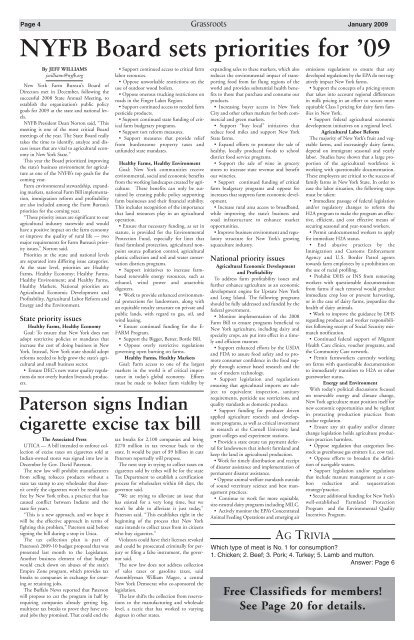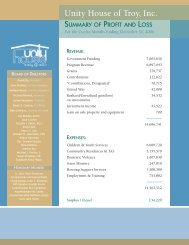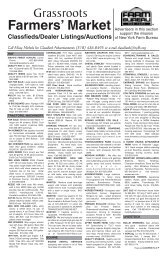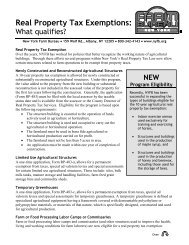new york farm bureau - Design Your Own Handbag
new york farm bureau - Design Your Own Handbag
new york farm bureau - Design Your Own Handbag
You also want an ePaper? Increase the reach of your titles
YUMPU automatically turns print PDFs into web optimized ePapers that Google loves.
Page 4 Grassroots January 2009<br />
NYFB Board sets priorities for ’09<br />
By JEFF WILLIAMS<br />
jwilliams@nyfb.org<br />
New York Farm Bureau’s Board of<br />
Directors met in December, following the<br />
successful 2008 State Annual Meeting, to<br />
establish the organization’s public policy<br />
goals for 2009 at the state and national levels.<br />
NYFB President Dean Norton said, “This<br />
meeting is one of the most critical Board<br />
meetings of the year. The State Board really<br />
takes the time to identify, analyze and discuss<br />
issues that are vital to agricultural economy<br />
in New York State.”<br />
This year the Board prioritized improving<br />
the state’s business environment for agriculture<br />
as one of the NYFB’s top goals for the<br />
coming year.<br />
Farm environmental stewardship, expanding<br />
markets, national Farm Bill implementation,<br />
immigration reform and profitability<br />
are also included among the Farm Bureau’s<br />
priorities for the coming year.<br />
“These priority issues are significant to our<br />
agricultural industry statewide and would<br />
have a positive impact on the <strong>farm</strong> economy<br />
or improve the quality of rural life — two<br />
major requirements for Farm Bureau’s priority<br />
issues,” Norton said.<br />
Priorities at the state and national levels<br />
are separated into differing issue categories.<br />
At the state level, priorities are Healthy<br />
Farms, Healthy Economy; Healthy Farms,<br />
Healthy Environment; and Healthy Farms,<br />
Healthy Markets. National priorities are<br />
Agricultural Economic Development and<br />
Profitability, Agricultural Labor Reform and<br />
Energy and the Environment.<br />
State priority issues<br />
Healthy Farms, Healthy Economy<br />
Goal: To ensure that New York does not<br />
adopt restrictive policies or mandates that<br />
increase the cost of doing business in New<br />
York. Instead, New York state should adopt<br />
reforms needed to help grow the state’s agricultural<br />
and small business sector.<br />
• Ensure DEC’s <strong>new</strong> water quality regulations<br />
do not overly burden livestock producers.<br />
• Support continued access to critical <strong>farm</strong><br />
labor resources.<br />
• Oppose unworkable restrictions on the<br />
use of outdoor wood boilers.<br />
• Oppose onerous trucking restrictions on<br />
roads in the Finger Lakes Region.<br />
• Support continued access to needed <strong>farm</strong><br />
pesticide products.<br />
• Support continued state funding of critical<br />
<strong>farm</strong> budgetary programs.<br />
• Support tort reform measures.<br />
• Support measures that provide relief<br />
from burdensome property taxes and<br />
unfunded state mandates.<br />
Healthy Farms, Healthy Environment<br />
Goal: New York communities receive<br />
environmental, social and economic benefits<br />
from the working landscapes created by agriculture.<br />
These benefits can only be sustained<br />
by creating public policy supporting<br />
<strong>farm</strong> businesses and their financial stability.<br />
This includes recognition of the importance<br />
that land resources play in an agricultural<br />
operation.<br />
• Ensure that necessary funding, as set in<br />
statute, is provided for the Environmental<br />
Protection Fund, especially for lines that<br />
fund <strong>farm</strong>land protection, agricultural nonpoint<br />
source pollution control, agricultural<br />
plastic collection and soil and water conservation<br />
districts programs.<br />
• Support initiatives to increase <strong>farm</strong>based<br />
re<strong>new</strong>able energy resources, such as<br />
ethanol, wind power and anaerobic<br />
digesters.<br />
• Work to provide enhanced environmental<br />
protections for landowners, along with<br />
an equitable royalty structure on private and<br />
public lands, with regard to gas, oil, and<br />
wind leasing.<br />
• Ensure continued funding for the E-<br />
FARM Program.<br />
• Support the Bigger, Better, Bottle Bill.<br />
• Oppose overly restrictive regulations<br />
governing open burning on <strong>farm</strong>s.<br />
Healthy Farms, Healthy Markets<br />
Goal: Farm access to one of the largest<br />
markets in the world is of critical importance<br />
in today’s global economy. Efforts<br />
must be made to bolster <strong>farm</strong> viability by<br />
Paterson signs Indian<br />
cigarette excise tax bill<br />
The Associated Press<br />
UTICA — A bill intended to enforce collection<br />
of excise taxes on cigarettes sold at<br />
Indian-owned stores was signed into law in<br />
December by Gov. David Paterson.<br />
The <strong>new</strong> law will prohibit manufacturers<br />
from selling tobacco products without a<br />
state tax stamp to any wholesaler that doesn’t<br />
certify the cigarettes won’t be resold taxfree<br />
by New York tribes, a practice that has<br />
caused conflict between Indians and the<br />
state for years.<br />
“This is a <strong>new</strong> approach, and we hope it<br />
will be the effective approach in terms of<br />
fighting this problem,” Paterson said before<br />
signing the bill during a stop in Utica.<br />
The tax collection plan is part of<br />
Paterson’s 2009-10 budget proposal that was<br />
presented last month to the Legislature.<br />
Another business element of that budget<br />
would crack down on abuses of the state’s<br />
Empire Zone program, which provides tax<br />
breaks to companies in exchange for creating<br />
or retaining jobs.<br />
The Buffalo News reported that Paterson<br />
will propose to cut the program in half by<br />
requiring companies already getting big,<br />
multiyear tax breaks to prove they have created<br />
jobs they promised. That could end the<br />
tax breaks for 2,100 companies and bring<br />
$270 million in tax revenue back to the<br />
state. It would be part of $9 billion in cuts<br />
Paterson reportedly will propose.<br />
The next step in trying to collect taxes on<br />
cigarettes sold by tribes will be for the state<br />
Tax Department to establish a certification<br />
process for wholesalers within 60 days, the<br />
governor said.<br />
“We are trying to alleviate an issue that<br />
has existed for a very long time, but we<br />
won’t be able to alleviate it just today,”<br />
Paterson said. “This establishes right in the<br />
beginning of the process that New York<br />
state intends to collect taxes from its citizens<br />
who buy cigarettes.”<br />
Violators could have their licenses revoked<br />
and could be prosecuted criminally for perjury<br />
or filing a false instrument, the governor<br />
said.<br />
The <strong>new</strong> law does not address collection<br />
of sales taxes or gasoline taxes, said<br />
Assemblyman William Magee, a central<br />
New York Democrat who co-sponsored the<br />
legislation.<br />
The law shifts the collection from reservations<br />
to the manufacturing and wholesale<br />
level, a tactic that has worked to varying<br />
degrees in other states.<br />
expanding sales to these markets, which also<br />
reduces the environmental impact of transporting<br />
food from far flung regions of the<br />
world and provides substantial health benefits<br />
to those that purchase and consume our<br />
products.<br />
• Increasing buyer access in New York<br />
City and other urban markets for both commercial<br />
and green markets.<br />
• Support “buy local” initiatives that<br />
reduce food miles and support New York<br />
State <strong>farm</strong>s.<br />
• Expand efforts to promote the sale of<br />
healthy, locally produced foods to school<br />
district food service programs.<br />
• Support the sale of wine in grocery<br />
stores to increase state revenue and benefit<br />
our wineries.<br />
• Support continued funding of critical<br />
<strong>farm</strong> budgetary programs and oppose fee<br />
increases that suppress <strong>farm</strong> economic development.<br />
• Increase rural area access to broadband,<br />
while improving the state’s business and<br />
road infrastructure to enhance market<br />
opportunities.<br />
• Improve business environment and regulatory<br />
structure for New York’s growing<br />
aquaculture industry.<br />
National priority issues<br />
Agricultural Economic Development<br />
and Profitability<br />
To address <strong>farm</strong> profitability issues and<br />
further enhance agriculture as an economic<br />
development engine for Upstate New York<br />
and Long Island. The following programs<br />
should be fully addressed and funded by the<br />
federal government.<br />
• Monitor implementation of the 2008<br />
Farm Bill to ensure programs beneficial to<br />
New York agriculture, including dairy and<br />
specialty crops, are put into effect in a timely<br />
and efficient manner.<br />
• Support enhanced efforts by the USDA<br />
and FDA to assure food safety and to promote<br />
consumer confidence in the food supply<br />
through science based research and the<br />
use of modern technology.<br />
• Support legislation and regulations<br />
ensuring that agricultural imports are subject<br />
to equivalent inspection, sanitary<br />
requirements, pesticide use restrictions, and<br />
quality standards as domestic produce.<br />
• Support funding for producer driven<br />
applied agriculture research and development<br />
programs, as well as critical investment<br />
in research at the Cornell University land<br />
grant colleges and experiment stations.<br />
• Provide a state estate tax payment deferral<br />
for landowners that inherit <strong>farm</strong>land and<br />
keep the land in agricultural production.<br />
• Work for timely distribution and receipt<br />
of disaster assistance and implementation of<br />
permanent disaster assistance.<br />
• Oppose animal welfare standards outside<br />
of sound veterinary science and best management<br />
practices.<br />
• Continue to work for more equitable,<br />
size-neutral dairy programs including MILC.<br />
• Actively monitor the EPA’s Concentrated<br />
Animal Feeding Operations and emerging air<br />
AG TRIVIA<br />
emissions regulations to ensure that any<br />
developed regulations by the EPA do not negatively<br />
impact New York <strong>farm</strong>s.<br />
• Support the concepts of a pricing system<br />
that takes into account regional differences<br />
in milk pricing in an effort to secure more<br />
equitable Class I pricing for dairy <strong>farm</strong> families<br />
in New York.<br />
• Support federal agricultural economic<br />
development initiatives on a regional level.<br />
Agricultural Labor Reform<br />
The majority of New York’s fruit and vegetable<br />
<strong>farm</strong>s, and increasingly dairy <strong>farm</strong>s,<br />
depend on immigrant seasonal and yearly<br />
labor. Studies have shown that a large proportion<br />
of the agricultural workforce is<br />
working with questionable documentation.<br />
These employees are critical to the success of<br />
family <strong>farm</strong>s in New York State. In order to<br />
ease the labor situation, the following steps<br />
must be taken:<br />
• Immediate passage of federal legislation<br />
and/or regulatory changes to reform the<br />
H2A program to make the program an effective,<br />
efficient, and cost effective means of<br />
securing seasonal and year-round workers.<br />
• Permit undocumented workers to apply<br />
for immediate H2A status.<br />
• End abusive practices by the<br />
Immigration and Customs Enforcement<br />
Agency and U.S. Border Patrol agents<br />
towards <strong>farm</strong> employees by a prohibition on<br />
the use of racial profiling.<br />
• Prohibit DHS or INS from removing<br />
workers with questionable documentation<br />
from <strong>farm</strong>s if such removal would produce<br />
immediate crop loss or prevent harvesting,<br />
or in the case of dairy <strong>farm</strong>s, jeopardize the<br />
health of dairy animals.<br />
• Work to improve the guidance by DHS<br />
regarding producer and worker responsibilities<br />
following receipt of Social Security mismatch<br />
notification.<br />
• Continued federal support of Migrant<br />
Health Care clinics, voucher programs, and<br />
the Community Care network.<br />
• Permit <strong>farm</strong>workers currently working<br />
on <strong>farm</strong>s with questionable documentation<br />
to immediately transition to H2A or other<br />
guestworker status.<br />
Energy and Environment<br />
With today’s political discussions focused<br />
on re<strong>new</strong>able energy and climate change,<br />
New York agriculture must position itself for<br />
<strong>new</strong> economic opportunities and be vigilant<br />
in protecting production practices from<br />
undue regulation.<br />
• Ensure any air quality and/or climate<br />
change legislation holds agriculture production<br />
practices harmless.<br />
• Oppose regulation that categorizes livestock<br />
as greenhouse gas emitters (i.e. cow tax).<br />
• Oppose efforts to broaden the definition<br />
of navigable waters.<br />
• Support legislation and/or regulations<br />
that include manure management as a carbon<br />
reduction and sequestration<br />
strategy/practice.<br />
• Secure additional funding for New York’s<br />
well-established Farmland Protection<br />
Program and the Environmental Quality<br />
Incentives Program.<br />
Which type of meat is No. 1 for consumption?<br />
1. Chicken; 2. Beef; 3. Pork; 4. Turkey; 5. Lamb and mutton.<br />
Answer: Page 6<br />
Free Classifieds for members!<br />
See Page 20 for details.







